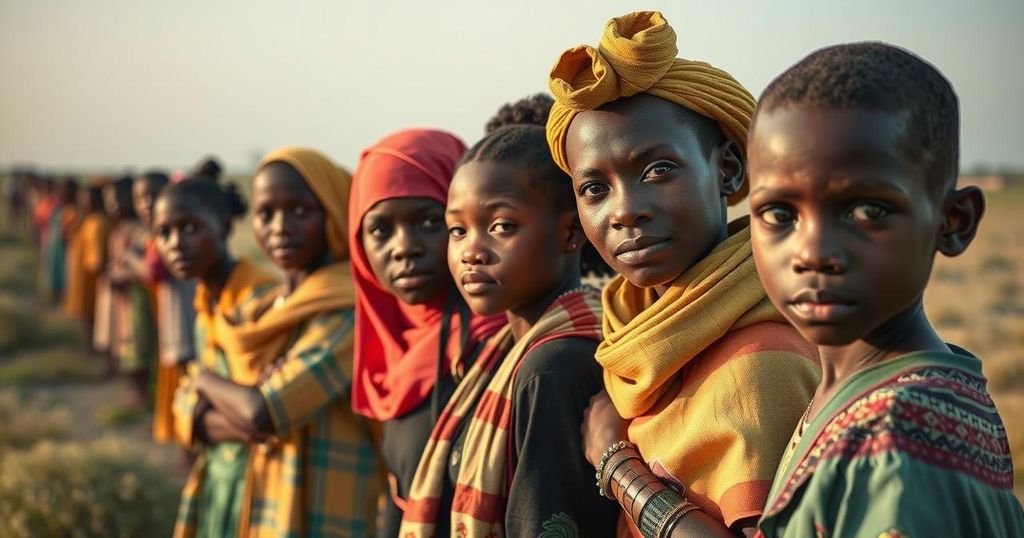Global news
AFRICA, AWEIL, BAHR EL GHAZAL, CIVIL WAR, CONFLICT RESOLUTION, EQUATORIA, GUANG CONG, HUMAN RIGHTS, HUMANITARIAN ISSUES, MONICA ZEFERINA, NORTHERN BAHR EL GHAZAL STATE, REFUGEES, SHAM, SHAMS SITTIQUE, SOUTH SUDAN, TAMBURA, UN, UNITED NATIONS MISSION, UNITED NATIONS MISSION IN SOUTH, UNMISS, WESTERN EQUATORIA STATE
Isaac Bennett
0 Comments
South Sudan: Violence Displaces Thousands, Political Reforms Aim for 2026 Elections
Thousands of South Sudanese have returned home after fleeing violence in Western Equatoria State, as UNMISS reports calm has returned. Meanwhile, political parties in Northern Bahr el Ghazal have committed to an action plan for the 2026 elections, following a delay from December 2024. UNMISS continues to be involved in monitoring both the stability in Tambura and the political landscape in preparation for future elections.
In a recent development, thousands of individuals from the Western Equatoria State in South Sudan have returned to their homes after being forcibly displaced by weeks of violence in Tambura and surrounding areas. The United Nations Mission in South Sudan (UNMISS) confirmed the restoration of calm in the region following this unrest. Many affected civilians initially sought refuge at a temporary UNMISS base, where some, like Monica Zeferina, shared their harrowing experiences of survival in hiding. Colonel Shams Sittique of UNMISS reiterated the mission’s commitment to monitoring the area closely and addressing the root causes of the violence.
Simultaneously, in Northern Bahr el Ghazal State, a coalition of political parties and civil society organizations has expressed a collective commitment to an action plan aimed at facilitating free and fair elections slated for December 2026. This initiative, supported by UNMISS, followed a three-day Political Parties’ Forum in Aweil, where representatives from diverse groups came together to agree on measures necessary for fostering an inclusive political environment. UNMISS Deputy Special Representative of the Secretary-General, Guang Cong, emphasized the importance of maintaining an open civic and political space for successful democratic processes. Notably, the South Sudanese government had previously postponed elections initially scheduled for December 2024 due to the need for a national census and other preparatory measures, marking this as the second delay since the nation’s independence in 2011.
The situation in South Sudan remains precarious, following years of civil conflict that have significantly impacted the lives of its citizens. The recent violence in Western Equatoria State, specifically in Tambura, underscored the ongoing instability and its detrimental effects, forcing many residents to flee their homes. As displaced populations seek safety, international organizations like the United Nations Mission in South Sudan (UNMISS) play a crucial role in monitoring the situation and providing humanitarian assistance. Furthermore, political developments in Northern Bahr el Ghazal highlight the efforts by various stakeholders to promote a democratic transition through upcoming elections, which have faced multiple delays.
This recent turmoil in Western Equatoria reflects the broader challenges faced by South Sudan in establishing peace and stability. The return of displaced individuals signifies a critical first step towards recovery, but the ongoing efforts for democratic reforms, as seen in Northern Bahr el Ghazal, are equally vital for the nation’s future. The consolidated action plans by political entities represent a hopeful move towards ensuring fair electoral practices, despite the setbacks encountered in the electoral timeline. Continued support from international organizations will be essential as the country navigates this complex landscape.
Original Source: newscentral.africa




Post Comment